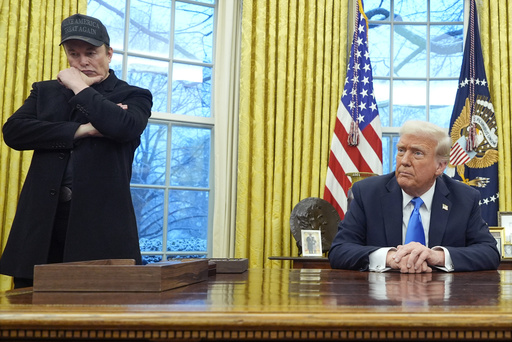
The White House barred an Associated Press reporter from attending an Oval Office event on Tuesday after the administration insisted the news organization modify its terminology regarding the Gulf of Mexico, which President Trump has sought to rename the Gulf of America.
The AP has not disclosed the name of the reporter who was denied access, but the incident reflects escalating tensions between the Trump administration and the press. In a similar vein, another AP journalist was also prevented from attending a separate event in the White House Diplomatic Room later that evening.
This unusual exclusion has raised concerns about potential infringements on constitutional free-speech rights, particularly regarding the press’s ability to report independently. Julie Pace, AP’s senior vice president and executive editor, labeled the administration’s actions as unacceptable.
“It is troubling that the Trump administration would retaliate against AP for practicing independent journalism,” Pace asserted in a statement. “Denying access to the Oval Office based on AP’s editorial decisions severely restricts public access to independent information and clearly undermines the First Amendment.”
No immediate follow-up from the Trump administration was available regarding these actions, nor was there any indication that other media personnel faced similar restrictions. Trump’s relationship with the media has generally been antagonistic. Just days prior, another contingent of news organizations had their access revoked at the Pentagon.
Following his inauguration on January 20, Trump declared intentions to change the Gulf of Mexico’s name to “Gulf of America” and indicated he would sign an executive order to this effect shortly after taking office. This announcement prompted sarcastic responses from Mexico’s president and skepticism regarding the likelihood of international adoption of the name change.
The Gulf of Mexico, which has been known by that name for over four centuries, is bordered by both the United States and Mexico. In early February 2017, just days after the inauguration, the AP asserted it would uphold its terminology of the Gulf of Mexico while concurrently acknowledging Trump’s proposed name change. The agency emphasized the necessity for clarity in place names to ensure international understandability.
Notably, AP style is referenced by countless journalists and writers across the globe. The barring of the AP reporter raised First Amendment concerns, as noted by Tim Richardson, director of journalism and misinformation for PEN America.
The White House Correspondents Association condemned the White House’s decision as unacceptable and urged a reversal of the policy. “The White House should not dictate the manner in which news organizations cover stories, nor should it penalize journalists for editorial decisions with which it disagrees,” stated WHCA president Eugene Daniels.
Recently, Google Maps adopted the term “Gulf of America,” citing its policy of adhering to the U.S. government’s directives. In contrast, Apple Maps retained “Gulf of Mexico” until later in the day when it also began listing “Gulf of America” in some searches, indicating a lack of consistency with the name change.
Additionally, Trump ordered that the mountain known as Mount McKinley in Alaska, which had previously been restored to its Indigenous name Denali, revert to honoring the 25th president. Former President Obama had officially named it Denali in 2015. AP clarified that it would utilize the federally recognized name of Mount McKinley since the geographical location is entirely within U.S. territory, granting Trump authority over such name changes at the federal level.

